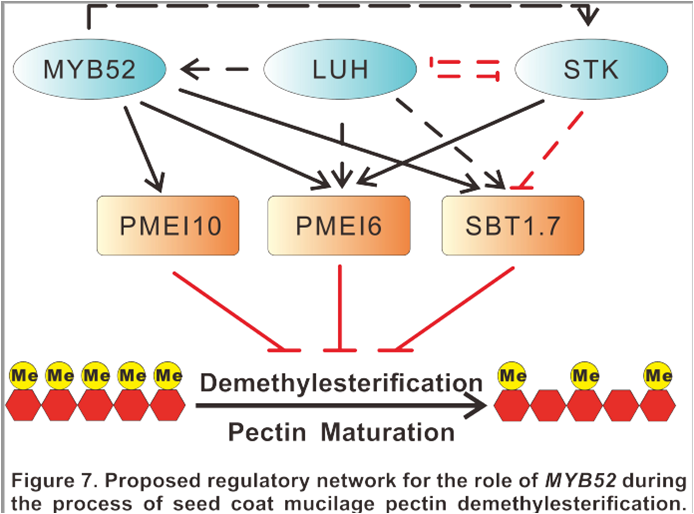
Links
Transcriptional Regulatory Mechanism of Pectin Demethylesterification in Plant Primary Cell Walls Analyzed by Tobacco Research institute
Recently, the team of tobacco genome functional innovation from Tobacco Research Institute of CAAS (Chinese Academy of Agricultural Sciences) has made new progress in the research on the regulation of pectin methylation in plant cell walls. The relevant research results are published on Plant Physiology.
Pectin, which is a major component of the plant primary cell walls, is synthesized and methylesterified in the Golgi apparatus and then demethylesterified by pectin methylesterases (PMEs) located in the cell wall. The degree of methylesterification affects the functional properties of pectin, and thereby influences plant growth, development and defense. However, little is known about the mechanisms that regulate pectin demethylesterification.

In this study, through a combination of biochemistry, genetics, omics, and molecular biology techniques, based on the system of seed coat mucilage. Researcher found that the absence of the MYB52 transcription factor is correlated with an increase in PME activity and a decrease in the degree of pectin methylesterification. Decreased methylesterification in the myb52 mutant is also correlated with an increase in the calcium content of the seed mucilage. Chromatin immunoprecipitation analysis and molecular genetic studies suggest that MYB52 transcriptionally activates PECTIN METHYLESTERASE INHIBITOR 6 (PMEI6), PMEI14, and SUBTILISIN-LIKE SERINE PROTEASE 1.7 (SBT1.7) by binding to their promoters. PMEI6 and SBT1.7 have previously been shown to be involved in seed coat mucilage demethylesterification. In addition, the authors characterized two PMEI14 mutants suggesting that PMEI14 has a role in seed coat mucilage demethylesterification (PMEI14 activity may be confined to the seed coat, while PMEI6 functions in the whole seed).
In this study, it revealed that MYB52 negatively regulates pectin demethylesterification in seed coat mucilage, and the identification of components of the molecular network involved, provides new insight into the regulatory mechanism controlling pectin demethylesterification and increases our understanding of the transcriptional regulation network involved in seed coat mucilage formation. MYB52 was also previously reported to be involved in the regulation of secondary cell walls. However, this study has provided new insight for studying the interaction between primary and secondary cell walls, as well as PME and PMEI.
Tobacco Research Institute of the CAAS was the first accomplished institute. Postdoctoral researcher Shi Dachuan and doctoral student Ren Anyan were the first authors, and Professor Kong Yingzhen was the corresponding author. This study was supported by the Elite Youth Program of CAAS and the National Natural Science Foundation of China (31670302, 31470291).
The original link:
http://www.plantphysiol.org/content/plantphysiol/early/2018/02/09/pp.17.01771.full.pdf?ijkey=8lImuXPOo3UWw&keytype=ref&siteid=plant